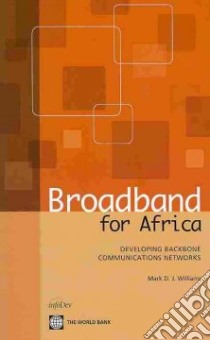Broadband for Africa - 9780821381724
Un libro in lingua di Williams Mark D. J. edito da World Bank, 2010
- € 11.70
- Il prezzo è variabile in funzione del cambio della valuta d’origine
Many countries in Sub-Saharan Africa see broadband ICT as an essential part of their long-term economic development strategy. Backbone networks are the high-capacity networks that lie at the heart of communications systems and allow the delivery of the high volumes of data needed for broadband. What high-capacity backbone networks that do exist in the region are typically limited to major urban areas and some inter-city routes. Competition between backbone networks is underdeveloped so the price of services remains high and quality is often poor. This pattern of network development is the result of high costs and regulatory restrictions on network development. Where countries have fully liberalized their telecommunications markets and promoted infrastructure competition, prices have fallen and quality improved. Backbone network policy should focus on promoting competition, reducing the cost of network construction and encouraging network development into currently underserved areas. Competition can be promoted by removing regulatory restrictions such as limits on the number of licenses and constraints on type of infrastructure and services that licensees can offer. The cost of backbone network development can be reduced by utilizing energy and transport infrastructure and reducing legal costs such as obtaining planning permission. Stimulating backbone network development beyond major urban areas can be achieved through establishing public-private partnerships to encourage operators to build networks into currently underserved areas.
Informazioni bibliografiche
- Titolo del Libro in lingua: Broadband for Africa
- Sottotitolo: Developing Backbone Communications Networks
- Lingua: English
- Autore: Williams Mark D. J.
- Editore: World Bank
- Collana: World Bank (Paperback)
- Data di Pubblicazione: 31 Marzo '10
- Genere: TECHNOLOGY and ENGINEERING
- Pagine: 81
- ISBN-10: 0821381725
- EAN-13: 9780821381724


